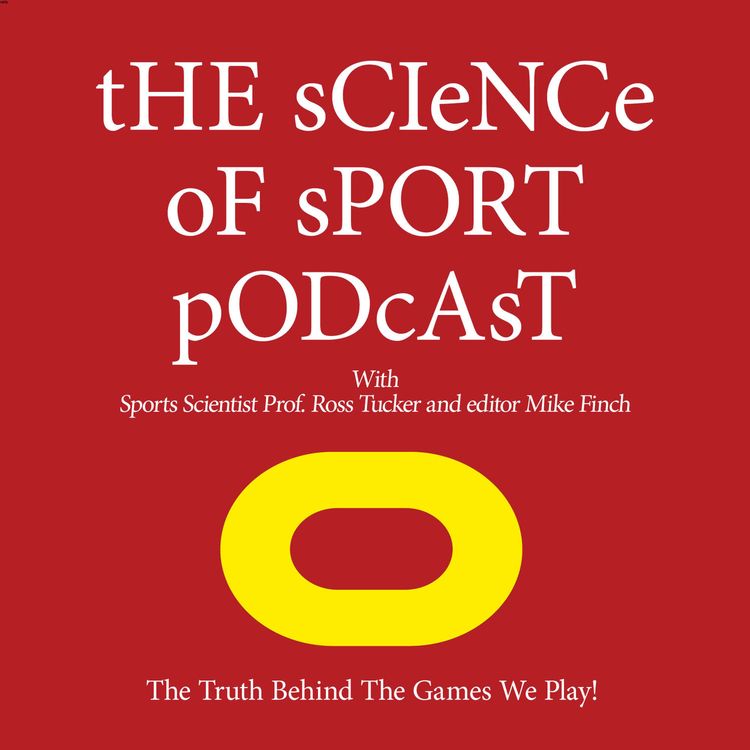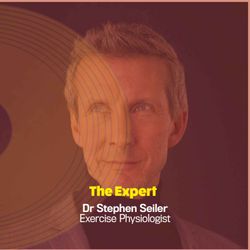Share

The Real Science of Sport Podcast
The Amelia Boone Interview: How the "Queen of Pain" Faces Down Her Demons
Season 1, Ep. 22
•
As one of the world's top obstacle racers and ultra runners, Amelia Boone is regarded as one of the toughest female athletes on the planet. But a lifetime battling eating disorders and Obsessive-Compulsive Disorder (OCD) almost cost the American her life and her sporting career. In this interview with Prof. Ross Tucker and host Mike Finch, Boone speaks openly about her dramatic past, relationships and the lessons others can take from her ongoing battle against her toughest opponent, herself.
More episodes
View all episodes

Spotlight: Fatigue as a Risk, a Requirement and a Red Herring / Grand Slam Track Reactions / New Olympic Sports
01:11:43|In this Spotlight episode, Ross and Gareth tackle a provocative question: should sports embrace fatigue to make the show better? We kick off with rugby union, where fresh legs off the bench and player welfare are fuelling debates about injury risks. But things quickly get philosophical. Some sports are basically designed to test how much fatigue you can take. Others are compromised when fatigue creeps in — skills drop, mistakes rise — yet fatigue also cranks up the drama and emotion. So, which sports thrive when athletes are running on empty, and which ones fall apart? And what would happen if you dialed up fatigue across the board — would it wreck the sport or make it even better?We also take a quick spin through the opening Grand Slam Track meeting in Jamaica, and peek ahead to the LA Olympics, where a bunch of new sports and events just got announced. Plus, concussion protocols and management are in the spotlight: a study from Scotland provides the first results on the lowering of tackle height in the community game; cyclist Elisa Longo-Borghini was pulled mid-race at Flanders; and Aussie cricketer Will Pucovski retired after his 13th concussion. Finally, we throw out a few predictions for Paris-Roubaix this Sunday. Got thoughts on these topics? Come chat with us on Discourse — link’s in the show notes!Show notesTo get stuck into these and other conversations in sports science, become a Patron of the podcast here, and then jump into the Discourse forum hereLinksThe Guardian article on the new events for the LA OlympicsWorld Rugby announces no evidence that the forwards-backs bench split needs to be changedIn 2023, I did a video presentation on the substitutes/fatigue injury risk issue, and you can watch that hereHere is Discourse member Hamish Gornall's paper on the tackle height findings from ScotlandReport on Longo-Borghini's Flanders crash and subsequent removal with concussionWill Pucovski's retirement due to repeat and worsening concussions
7. Heat, Hydration and 'Bum Clinics': The Science of Event Medicine
01:39:27||Season 7, Ep. 7Join the team as they dive into the complex world of event sports medicine with guest Dr Darren Green. The team talk about the complexity of setting up a medical facility for major sporting events while tackling the challenges of extreme weather, hydration, injuries and cardiac incidences. Dr Green explains how medical teams work with event organisers to ensure competitor safety and gives practical advice on how participants should look after themselves to ensure they don't end up in a medical tent. There's also a detailed discussion on the infamous 'Bum Clinic' used at the Absa Cape Epic so be warned that this podcast does include some graphic content.Dr Green heads up the corporate events department for Mediclinic Southern Africa, which entails oversight of all medical support to major events, setting up the pre-hospital and field hospital infrastructure with niche expertise and ICU capability in remote sites. Dr Green functions as the Chief Medical Officer for many international sporting events including the World Cup Rugby Sevens, British and Irish Lions tour, Cape Town Cycle tour, Epic and Cape Town Marathon. He is an Alumnus of the University of Stellenbosch, where he completed both his undergraduate degree in Medicine and four years of postgraduate training in Neurology and, more recently, finished off a master’s in Sports and Exercise Medicine at the University of Stellenbosch.
Spotlight: Matters of the Heart / Heart Health in Marathon Runners / Max HR / Concussion and Coaches
59:13|It's a heart-to-heart on Spotlight today, as Gareth and Ross kick off by discussing a Discourse question about whether running marathons is bad for your heart? Ross describes five cardiac "risks" that have been documented, giving context and a bit of reassurance in response to theory that excessive endurance training is damaging to heart tissue. We then talk about maximum heart rate, and why it's an imperfect anchor for training prescription and a poor comparison between people. We shift from heart to brain to briefly discuss whether coaches should be sanctioned when players tackle poorly in rugby, and end off with a brief look at two teen phenoms competing in Australia last week, wondering whether their trajectories are inviting unreasonable pressure at too young an age.DiscourseAs always, Spotlight is inspired by your engagement in our Discourse community, and you can become a member by visting the Patreon site, and pledging a small monthly amount that gets you access and an opportunity to engage with, and learn from, fellow listeners.Show notesIan's question about heart risk from marathon running, and some excellent Discourse replies - Members onlyThe research paper on troponin elevation after marathons, which kicked off the Discourse discussion at the front of today's showGood insight and discussion on whether too much exercise is bad for you?Here's that article i mentioned where Tim Noakes punched some holes in the theory that marathon runners would be protected against coronary artery diseaseUltimately, sudden cardiac death in marathon runners is rare. Here's a review that explores just how rare, and explains the risksA Discourse thread on max HR and why it's a limited anchor and set ceiling for training prescription and managementHere's a paper that describes that sub-max HR test that can be used to identify training adaptation, overreaching and early signs of illness by looking at HR recovery after exerciseCompound Score revisited and re-explained - following last week's Spotlight, Ross shared more thoughts to explain the Compound Score. Here's that article, available to all, but initially on Discourse
Spotlight: A New IOC President / A New Tool To Protect Women's Sport / A New Power Metric
01:54:49|It's a bumper Spotlight in a bumper week of big sports news. To cover it comprehensively, Ross & Gareth are joined by Sean Ingle of The Guardian to discuss the election of Kirsty Coventry to lead the International Olympic Committee. We explore her path to victory, enabled by Thomas Bach's support, and how she might lead the organization through looming challenges, including the integrity of the IOC's bid/host city selection process, and women's sport. On the subject of women's sport, Sean also chats to us about World Athletics' announcement that it will introduce pre-clearance screening for athletes wishing to be eligible for the women's category. It's a move that forms part of Sebastian Coe's declaration to 'doggedly' defend women's sport. We explore how sex screening works, and issues it may raise, and solve.We then shift to cycling to discuss a remarkable Milan-San Remo performance by Tadej Pogacar, showcasing superiority and versatility not seen in cycling for a very long time. It tees up the compound score, accounting for power output and performance in both absolute and relative terms. A few odds and ends thrown in wrap up a big show.Show notesTo become a member of Discourse and be part of the conversation, including driving the content of these shows, here's your link to Patron (no wait, it's Patreon). A small monthly pledge gets you access to Discourse, and a whole lot more discussion that might make more sense than the pod! (sometimes!)Article by guest Sean Ingle on the big issues facing Kirsty Coventry as she enters the IOC frayAnother by Ingle, this time on the process and dealings behind the IOC Election, including Thomas Bach's roleArticle on Sebastian Coe's announcement of World Athletics' introduction of pre-clearance testing for female eligibilitySome analysis of the power numbers at the Milan San Remo race, as discussed on the podcast. Take the estimates with a pinch of salt - the high speeds introduce a lot of errorBrief abstract that introduces the Compound Score in cycling, and how it has the best predictive power for race resultsMore comprehensive research article on the compound score (needs access to journal for full read)The paper asking the question about "lactic acidosis", to which we all should know the answerThe answer to the lactate question
Spotlight: Teen Sprint Phenoms Accelerate / Talent Difference Makers / Community Rugby Concussion Insights
01:07:25|In this Spotlight, Gareth and Ross kick off by looking back at teen sprint phenom Gout Gout's latest performances, which continue to project a spectacular yet unknowable future. Across the Ocean, a young South African put down a teen-sprint marker of his own with a sub-10s performance, and we use those performances to discuss the nuanced, fluid and undefinable element of super-talents in sport. What matters, what doesn't, what is required for entry into the elites, and what makes a difference once there?We also discuss whether the addition of the Sydney Marathon (among others) to the prestigious World Marathon Majors dilutes their equity, which presents a chance to discuss heat and performance related to both marathons and the currently ongoing Cape Epic. Finally, we chat concussion in the community game, in the aftermath of some misinformed perspectives raised by politicians in the UK about the concussion risk with lower tackle height in the game.Show notesMel Breen wins the 2012 Stawell Gift race from scratchBayanda Walazas asymmetric running styleDiscourse is our VIP community, and if you'd like to be a part of that conversation, receive Gareth's Caught my Eye newsletter, and to interact with fellow listeners, the way to do it is to check out this link, and become a patron of the podcast for a small monthly donation. Thanks for all your support!
Spotlight: Physiological "Frugality", Power and Speed / Discourse Fuelling Success / Trans Sport Update
01:21:39|In this week's Spotlight, we swing the light from cycling to doping, via trans news updates and some success stories from our Discourse members. We kick off with a chat about whether we've been too obsessed with power numbers, and not talking enough about speed, as pointed out by Christoph Roodhooft of Alpecin's pro-cycling team. We discuss what it means to be an "economic cyclist", which allows Gareth to propose the concept of "physiological frugality", which we are 100% sure will take over from "durability" as the next-big-thing in elite cycling by 2027!We also chat briefly about positive fuelling experiences shared with us by Discourse members, who've managed to push their energy intakes up thanks to the experts we've heard from on the pod. We check in on some controversial topics, including the transgender athletes in sport debate, where a new paper, a legal decision and an imminent IOC election are all in the spotlight, and finally, we briefly discuss Shelby Houlihan's own words about her doping defence in an interview with Letsrun.com.Show notesAs mentioned, Discourse is our VIP Community where you can share bicarb recipes, tales of fuel success, and a whole lot more! You become a member by pledging a small amount on Patreon, which you can access here, and that will give you access to all the chat and sports science insights from members.LinksThe GCN segment discussed on the show, giving rise to Gareth's concept of "frugality"The Handelsman & Bermon paper that is discussed brieflyFull Decision in the Hamilton vs Telegraph press complaintThis is the full, in-depth analysis I did for Letsrun on the Shelby Houlihan decision, including the wrong application or misunderstanding of the Technical Document, and the carbon isotope ratio analysis that refuted Houlihan's argumentsThe interview Houlihan did last week with Letsrun, as alluded to by Gareth in the podcast
Spotlight: The Science of Improving Human Performances / Technological Advances in Sport / Talent Scouting Through Zwift
01:12:18|On today's Spotlight, we ask why runners are racing faster than ever? The same could also be said of cyclists, and we use an intriguing article by Amby Burfoot to explore and discuss the possible contributors, ranging from super shoes to the "Bannister effect". It leads us back to ground we've covered before (shoe tech, carbs), some areas we have yet to cover in detail (bicarbonate), and down some dark alleys that may contain the future (and possibly present) of doping methods.We also talk about technology in sport, and about which sports have seen the biggest, fastest leaps as a result of innovation, taking a quick tour of some other devices that have 'recalibrated' sporting performances and human limits.Finally, we discuss some of the science and performances in the Zwift Academy 2025, the latest iteration of a competition to identify and recruit aspirant cyclists into two professional cycling teams. We explore the tests used on the show, their value, and how hugely confounded the talent prediction is, even in a sport as measurable as cycling.Show notesAs mentioned, Discourse is where it all goes down, and here's where you click to become a member for a small monthly donation. Sign up as a Patron, and you'll have access to this community, and all the fascinating insights shared by fellow listenersLinksSean Ingle's article on that four-minute mile projectionAmby Burfoot's intriguing thought experiment canvassing opinion on what is driving faster running performancesThe paper mentioned on the show describing novel drugs to "manage classical heme disorders" - not a huge leap to performance enhancement, but the molecular switch approach to doping may be a concernThe podcast we once did on technology in sport - includes klapskates, swimsuits, and bicyclesThe BBC article on the increasing prevalence of obesity and overweightThe Lancet study described in the BBC articleThe first episode of the 2025 Zwift Academy, the rest can be found on the same channelSome normative power output from elite men, and elite women's cycling. Compare yourself to the pros. I'll put the summary tables up on Discourse for members
Spotlight: A Women's Sub 4-minute Mile? / A Tale of Textbook Heat Adaptation
01:05:44|In this Spotlight, Ross and Gareth become "bros" to discuss and critique a recent paper that forecasts a sub-4 min mile in women (specifically, Faith Kipyegon) if drafting strategies were improved. Ross explains his skepticism and reaction to straw man arguments in media about the paper, and the framing of the seven second improvement required as a "mental barrier". This ushers in a new segment for the show, "Grinds my Gears!".We also learn from a Discourse member, @pauliuspeciura, about how to execute a textbook heat adaptation strategy for a race he participated in recently. We talk about the physiology of heat adaptation, and how to implement a downscaled, but necessary approach to heat in your next race. We also briefly touch on two bits of news, one concerning an increasing lack of physical activity in children in the UK, and other a peculiar, though not unique, explanation for doping contamination in the recent case of triathlete Imogen Simmonds**Ross mentioned a USA Sprinter who was cleared of a positive drug test after using "passionate kissing" as a defence. That was Gil Roberts, not Derrick Brew as mentioned (article link below). Roberts, incidentally, got cleared of this positive result in 2017, but then had another doping violation in 2022 (16 month ban) and then another in 2023, and is now serving an 8 year ban!Show notesSpotlights are inspired by Discourse, and then the discussion continues there after! If you want to become a member of that community, here's the link to Patreon, where you sign up, and then it'll direct you to the Discourse Platform where the floor is yours!LinksArticle in the Guardian that talks about the decline in numbers of PE Teachers in BritainA paper in the BJSM on the physical activity issues and the need to optimize social factorsImogen Simmonds' post on the doping positive for Ligandrol. Time will tell whether there's more to itThe news piece on Gil Roberts and the passionate kissing defenceDiscourse Member Paulius Peciura discusses his heat adaptation strategy and race outcome here - Note: Discourse members onlyThe paper analysing Kipyegon's World Record, postulating the sub-4 is possible with a massive 75% drafting benefitThe New York Times piece on the sub-4 theory that contains the quotes that ground Ross' gears!
6. Rethinking Polarised Training with Dr Stephen Seiler
01:52:14||Season 7, Ep. 6Dr. Stephen Seiler is arguably the world authority on endurance training, and popularized the concept of polarized training. But a new paper has revealed some fresh insights into training polarization which suggest that the training structure may only be suitable for certain types of athletes. Enjoy this deep dive into one of the most-discussed endurance topics as we break down the theory, look at the results of this ground-breaking systematic review, discuss how the results can inform training protocols and what future studies are needed. Seiler is an exercise physiologist and Professor of Sports Science from the University of Agder in Norway.SHOW NOTESTHE PAPER ON Training Intensity Distribution Intervention will Produce the Greatest Improvements in Maximal Oxygen Uptake and Time-Trial Performance in Endurance Athletes? A Systematic Review.